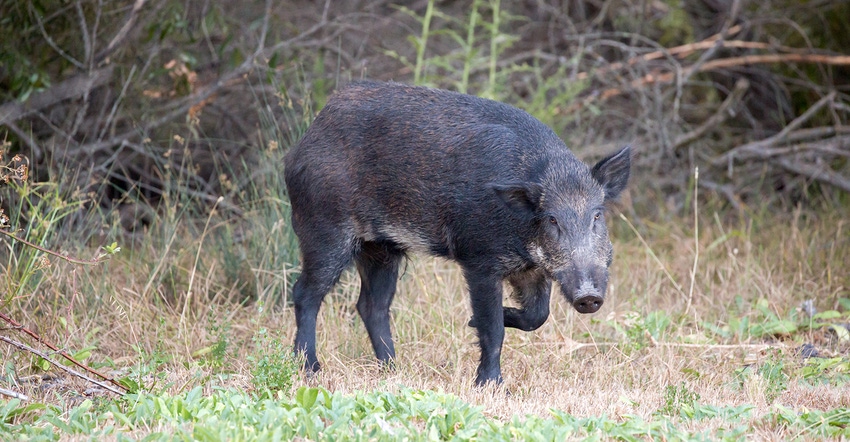Develop biosecurity program with feral swine in mind
Feral swine are known to carry more than 40 diseases and parasites that can affect livestock, pets, wildlife and even humans.
January 2, 2020

Feral swine are a threat to livestock health and agricultural lands. It is estimated that feral swine, considered an invasive species, cause about $1.5 billion in agricultural damage annually in the United States. Regardless of the terminology used, feral pigs, wild boar and any hybrids, are all the same species, Sus scrofa. All domesticated pigs are also descendants of wild boar.
There are 100 counties in North Carolina and almost all of them have reported feral swine. While the majority of feral swine are reported in the mountain region of the state, there are also large densities of feral pigs in the coastal plain. This is concerning to swine producers in North Carolina because the coastal plain also contains the highest densities of commercial swine. Due to the growing concern of feral swine in the state, the North Carolina Feral Swine Task Force was formed in 2018 to address issues. The task force is an effort to coordinate state and federal groups working and develop solutions.
The task force consists of members of the North Carolina Department of Agriculture and Consumer Services, North Carolina Wildlife Resource Commission, North Carolina State University Cooperative Extension, North Carolina Division of Public Health, USDA Animal and Plant Health Inspection Service Veterinary Services and USDA Wildlife Services.
Over the last year, the task force has conducted informational sessions across the state to allow residents to ask questions about feral swine in their area. The sessions include information on resources and services available from the North Carolina Wildlife Resource Commission and USDA Wildlife Services, and some have included demonstrations on trapping feral swine. Farmers, livestock producers and other interested groups are encouraged to participate.
The task force will continue to conduct these sessions throughout the next year. The North Carolina Feral Swine Task Force has also set up a helpline in which feral swine sightings can be reported. This is to assist the North Carolina Wildlife Resource Commission to build a comprehensive map of feral swine and the damage they cause. Hunters or residents that trap feral swine also have the option to collect samples with a feral swine disease testing kit. Feral swine are known to carry more than 40 diseases and parasites that can affect livestock, pets, wildlife and even humans. Brucellosis, pseudorabies, porcine circovirus, porcine reproductive and respiratory syndrome, porcine epidemic diarrhea virus and trichinellosis are the main concerns for swine producers, but the threat of feral pigs carrying African swine fever has become an important concern for the swine industry. The kits are confidential and provided free by the North Carolina Department of Agriculture and Consumer Services to help determine the diseases prevalent in feral swine in the state. All of this data collected are helping the task force determine the economic impact of feral swine on agriculture in North Carolina.
A biosecurity plan is important to stopping the spread of diseases by feral swine. If you produce pigs in an area with feral swine, especially if your pigs are not confined, here are some considerations for keeping your herd safe.
Ensure that feral pigs cannot access domestic pig enclosures or facilities. A majority of the diseases mentioned, including ASF, require animal contact for the disease to spread. If you have outdoor enclosures you may need to consider adding secondary fencing to keep feral pigs out.
Clean up feed spills and keep feed storage secured. Feed waste can be an attractant for feral pigs as well as rodents and other wildlife.
Remove mortalities from site and keep mortality containment secured. If you use composting as part of your mortality management plan this can also attract feral pigs. Proper carcass coverage, completely covered carcasses and appropriate compost temperature will keep wildlife out, however fencing around a compost unit may be required.
Feral pigs are a nuisance, but having knowledge of the problem and building a biosecurity plan to deal with it, will keep you and your farm safe from harm.
Source: Jonathan Holt, who is solely responsible for the information provided, and wholly owns the information. Informa Business Media and all its subsidiaries are not responsible for any of the content contained in this information asset.
You May Also Like


